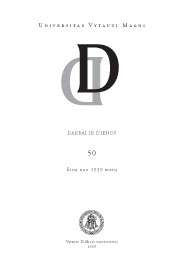ŽANRO PROBLEMOS XIX AMŽIAUS LIETUVIŲ LITERATŪROJE
THE CONCEPTION OF LITERARY GENRE IN 19TH-CENTURY LITHUANIA
Author(s): Irena BuckleySubject(s): Literary Texts
Published by: Vytauto Didžiojo Universitetas
Keywords: žanriniai modeliai; kultūrinė dominantės; religinė literatūra; pasaulietinės rašymo formos; genre-related models; cultural dominants; religious literature; secular forms of writing
Summary/Abstract: If one analyzes the conception of genre in 19th-century Lithuanian literature from a mythopoetical, rhetorical, and sociocultural point of view, one comes to the conclusion that clear genre-related models were still lacking. The young literature was just borrowing them, trying to adapt them to its needs, while the writer found it difficult to define and give a proper name to his or her own genre; this resulted in frequent terminological confusion and inexact genre sub-headings. The late-occurring differentiation of genres led to a search for analogies in oral literature where the genres also lacked strict definition. The choice of a genre was influenced by general cultural dominants. In the early 19th c. the genres of Lithuanian poetry by and large took over the normativity of a classicist aesthetics tied to the rhetorical tradition. The Christian rhetoric dominant in the middle of that century not only embraced the genres of religious literature but also influenced secular forms of writing. Toward the end of the 19th c. a stronger polyphony seems to suggest that the richer and more complex the social stratification is, the more genres there emerge and the faster they differentiae. Still it should not be thought that in the literature of the past more attention is paid to genre-related requirements. To the creators of a new literature selecting and naming their genre, what is hugely important, lie not so much in any formal criteria as in the function of the text.
Journal: Darbai ir dienos
- Issue Year: 2009
- Issue No: 50
- Page Range: 59-72
- Page Count: 14
- Language: Lithuanian

